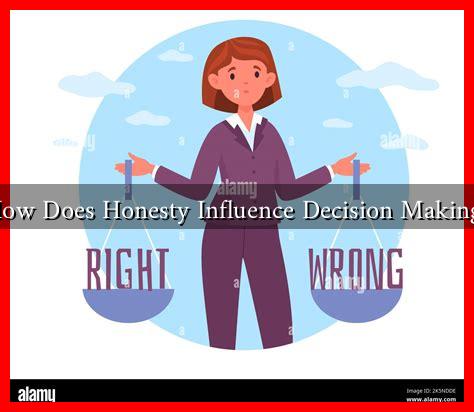-
Table of Contents
- How Does Honesty Influence Decision Making?
- The Role of Honesty in Decision-Making
- Case Studies: Honesty in Action
- Case Study 1: The Volkswagen Emissions Scandal
- Case Study 2: Johnson & Johnson’s Tylenol Crisis
- The Psychological Impact of Honesty
- Statistics on Honesty and Decision-Making
- Conclusion: The Power of Honesty in Decision-Making
How Does Honesty Influence Decision Making?
Honesty is often regarded as a fundamental virtue, but its influence extends far beyond personal integrity. In the realm of decision-making, honesty plays a crucial role in shaping outcomes, fostering trust, and enhancing collaboration. This article explores how honesty impacts decision-making processes, supported by examples, case studies, and relevant statistics.
The Role of Honesty in Decision-Making
Decision-making is a complex process that involves evaluating options, weighing risks, and predicting outcomes. Honesty serves as a guiding principle that can significantly affect the quality of decisions made in both personal and professional contexts. Here are some key ways in which honesty influences decision-making:
- Building Trust: Honesty fosters trust among individuals and teams. When people are transparent about their intentions and motivations, it creates a safe environment for open dialogue and collaboration.
- Enhancing Clarity: Honest communication eliminates ambiguity, allowing decision-makers to understand the implications of their choices better. This clarity is essential for making informed decisions.
- Encouraging Accountability: When honesty is prioritized, individuals are more likely to take responsibility for their actions. This accountability can lead to more thoughtful and deliberate decision-making.
Case Studies: Honesty in Action
To illustrate the impact of honesty on decision-making, consider the following case studies:
Case Study 1: The Volkswagen Emissions Scandal
In 2015, Volkswagen was embroiled in a scandal involving the manipulation of emissions tests for diesel vehicles. The company’s decision to prioritize profit over honesty led to significant legal repercussions, loss of consumer trust, and a decline in sales. This case highlights how dishonesty can lead to poor decision-making and long-term consequences.
Case Study 2: Johnson & Johnson’s Tylenol Crisis
In contrast, Johnson & Johnson’s handling of the Tylenol poisoning crisis in 1982 exemplifies the power of honesty in decision-making. The company promptly recalled over 31 million bottles of Tylenol after reports of tampering, prioritizing consumer safety over profits. Their transparent communication and commitment to honesty helped restore public trust and solidified their reputation as a responsible company.
The Psychological Impact of Honesty
Research in psychology supports the notion that honesty influences decision-making. A study published in the journal “Organizational Behavior and Human Decision Processes” found that individuals who engage in honest communication are more likely to make ethical decisions. The study revealed that honesty reduces cognitive dissonance, allowing individuals to align their actions with their values.
Statistics on Honesty and Decision-Making
Several statistics underscore the importance of honesty in decision-making:
- According to a survey by the Harris Poll, 82% of respondents believe that honesty is essential for effective leadership.
- A study by the PwC found that organizations with a strong ethical culture, which includes honesty, are 3.5 times more likely to outperform their competitors.
Conclusion: The Power of Honesty in Decision-Making
In conclusion, honesty is a vital component of effective decision-making. It builds trust, enhances clarity, and encourages accountability, all of which contribute to better outcomes. The case studies of Volkswagen and Johnson & Johnson illustrate the stark contrast between the consequences of dishonesty and the benefits of transparency. As individuals and organizations navigate complex decisions, prioritizing honesty can lead to more ethical, informed, and successful choices. Embracing honesty not only strengthens relationships but also fosters a culture of integrity that can drive long-term success.


